formerly eScholarship Editions


|
|
|
|
Your search for
'Biology' in subject
and
Public
in rights
found 5 book(s). | Modify Search | Displaying 1 - 5 of 5 book(s) | |
| 1. | 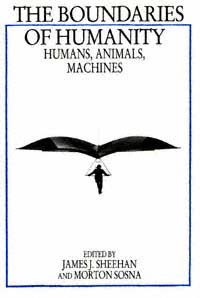 | Title: The Boundaries of humanity: humans, animals, machines Author: Sheehan, James J Published: University of California Press, 1991 Subjects: Philosophy | History and Philosophy of Science | Biology | Technology and Society Publisher's Description: To the age-old debate over what it means to be human, the relatively new fields of sociobiology and artificial intelligence bring new, if not necessarily compatible, insights. What have these two fields in common? Have they affected the way we define humanity? These and other timely questions are addressed with colorful individuality by the authors of The Boundaries of Humanity .Leading researchers in both sociobiology and artificial intelligence combine their reflections with those of philosophers, historians, and social scientists, while the editors explore the historical and contemporary contexts of the debate in their introductions. The implications of their individual arguments, and the often heated controversies generated by biological determinism or by mechanical models of mind, go to the heart of contemporary scientific, philosophical, and humanistic studies. [brief] Similar Items |
| 2. | 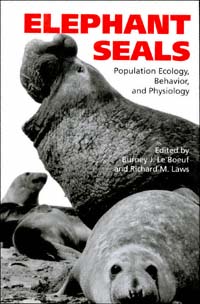 | Title: Elephant seals: population ecology, behavior, and physiology Author: Le Boeuf, Burney J Published: University of California Press, 1994 Subjects: Science | Natural History | Biology | Ecology Publisher's Description: The largest of all seals, elephant seals rank among the most impressive of marine mammals. They are renowned for their spectacular recovery from near-extinction at the end of the nineteenth century when seal hunters nearly eliminated the entire northern species. No other vertebrate has come so close to extinction and made such a complete recovery. The physiological extremes that elephant seals can tolerate are also remarkable: females fast for a month while lactating, and the largest breeding males fast for over one hundred days during the breeding seasons, at which times both sexes lose forty percent of their body weight. Elephant seals dive constantly during their long foraging migrations, spending more time under water than most whales and diving deeper and longer than any other marine mammal.This first book-length discussion of elephant seals brings together worldwide expertise from scientists who describe and debate recent research, including the history and status of various populations, their life-history tactics, and other findings obtained with the help of modern microcomputer diving instruments attached to free-ranging seals. Essential for all marine mammalogists for its information and its methodological innovations, Elephant Seals will also illuminate current debates about species extinctions and possible means of preventing them. [brief] Similar Items |
| 3. | 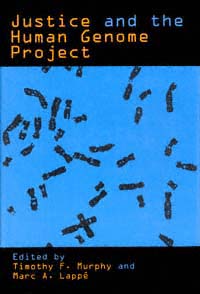 | Title: Justice and the human genome project Author: Murphy, Timothy F 1955- Published: University of California Press, 1994 Subjects: Philosophy | Ethics | Biology | Medicine Publisher's Description: The Human Genome Project is an expensive, ambitious, and controversial attempt to locate and map every one of the approximately 100,000 genes in the human body. If it works, and we are able, for instance, to identify markers for genetic diseases long before they develop, who will have the right to obtain such information? What will be the consequences for health care, health insurance, employability, and research priorities? And, more broadly, how will attitudes toward human differences be affected, morally and socially, by the setting of a genetic "standard"?The compatibility of individual rights and genetic fairness is challenged by the technological possibilities of the future, making it difficult to create an agenda for a "just genetics." Beginning with an account of the utopian dreams and authoritarian tendencies of historical eugenics movements, this book's nine essays probe the potential social uses and abuses of detailed genetic information. Lucid and wide-ranging, these contributions will provoke discussion among bioethicists, legal scholars, and policy makers. [brief] Similar Items |
| 4. | 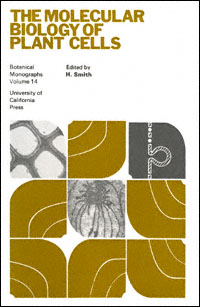 | Title: The molecular biology of plant cells Author: Smith, H. (Harry) 1935- Published: University of California Press, 1978 Subjects: Science | Botany | Biology Similar Items |
| 5. | 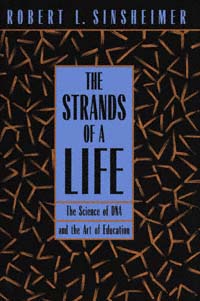 | Title: The strands of a life Author: Sinsheimer, Robert Published: University of California Press, 1994 Subjects: Science | Biology | History and Philosophy of Science | Autobiographies and Biographies Publisher's Description: From heading a campus of the largest public university in the nation to participating in the birth of molecular biology, Robert L. Sinsheimer's experiences have given him a unique vantage point from which to view the paths that science and education have taken in the twentieth century. This book tells the story of his life, of his own growth, and of his leading role in both science and higher learning during the past fifty years.Robert L. Sinsheimer's experiences have given him a unique vantage point from which to view the paths that science and education have taken in the twentieth century. He has witnessed and participated in the birth of molecular biology, taught at leading universities, and headed a campus of the largest public university in the nation. This book tells the story of his life, of his own growth, and of his leading role in both science and higher learning during the past fifty years.While a student and then a researcher at MIT, and as a professor at Iowa State University and later at Caltech, Sinsheimer was a major participant in the "molecular revolution" that radically transformed the science of life. He was also one of the first to foresee the potential of molecular biology and to draw attention to some of the ethical quandaries the new science would pose.In 1977 Sinsheimer became chancellor at the University of California, Santa Cruz, at a crucial time in the campus's evolution. He played a key part in revitalizing the educational experiment that has made the campus unique among the state's institutions of higher learning.Sinsheimer's life has been lived at the ever-advancing edge of knowledge. In simple, elegant language, he offers historical and philosophical insights into the world of science and the mind of a scientist. His reflections are both fascinating and valuable. [brief] Similar Items |